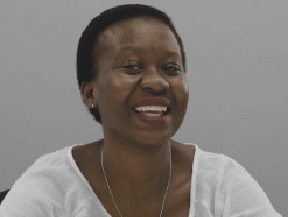Derick van der Walt
Growing up in Polokwane, Kgadi Senyatsi never dreamt that she would one day spend a year in Australia learning the tricks of the pig farming trade and would eventually head up the business development division at SAPPO.
Senyatsi joined SAPPO in 2014 and now leads a team of five business developers, who mentor new pig farmers countrywide, among all their other duties.
“I have always been involved in farming. In the rural areas most families have some form of farming activity going on to ensure that there is food for the table. We farmed mainly with maize and had a few cattle and sheep.”
Even as a youngster she followed the maize price “and I was always puzzled why the commercial farmers’ maize always looked better than ours did.”
When her parents saw that farming was in her blood, they sent her to an agricultural high school in Mokopane. After school she studied towards a degree in agricultural management at Tshwane University of Technology (TUT). Her first practical experience, however, did not involve pigs. Her initial job was as an animal attendant at a feedlot in North West. A short course in pig production at the ARC followed in 2005.
By accident
“This happened by accident,” she says. “As part of my practical training for my TUT qualification I had to attend a short course and I was too late for the short course in feedlotting. There was, however, still space in the piggery course.”
And so the journey began.
Volunteering at TUT’s experimental farm for a few months followed, and then she saw an opportunity on the internet at a pig farm in Australia. She applied and got the job. And no, she was not scared to leave South Africa for a country she has never been before. “I was exited!” she says laughingly.
Senyatsi spent a year (December 2007 to December 2008) on a family farm with 1 600 sows.
“At that stage pig farming was not so big there, with the focus on sheep farming. They have very strict biosecurity rules for all commodities, especially for products entering the country.”
Senyatsi says that something that she found unique was that nobody mollycoddled her and held her hand. “I had to learn quickly and farmers expected that from you.”
“In general, the people were very friendly but they still had the perception of South Africa being in the heart of darkest Africa, a jungle swarming with wild lions,” she laughs.
Back in South Africa she joined the Western Cape department of agriculture as an extension officer. Her task was to mentor small-scale pig farmers.
She joined SAPPO in 2014. Her tasks as head of SAPPO’s business development division are to develop new farmers’ skills, training, mentorship and liaising with stakeholders on behalf of SAPPO.
And what are the challenges? “Generally there is a misconception about pig farming. People think it is a quick fix to get rich. Because sows get many piglets at one time, people believe that this will make them lots of money. They are often surprised to realise how expensive inputs are and how much it costs to raise a pig. There is a lack of knowledge, information and skills and we have to fill that void. The major and common mistake people make is to leave their jobs before their pig businesses are sustainable. Some even use their retirement funds to start pig farming, which in most cases do not realise the return on investment.”
The business development division not only teaches the correct way to farm with pigs, it also conveys industry knowledge to new farmers.
And is SAPPO making progress? “Definitely,” she believes. “There has been a vast improvement since 2014. At least we now know where most of the small farmers are. Baynesfield plays a crucial role. Apart from the training students receive, it exposes people to pig farming and the industry. They learn the need and value of high biosecurity measures. We also teach them the business side of the industry.”
Senyatsi says that Baynesfield also serves as sifting mechanism. “People not fit for pig production often decide not to continue after they realise what is at stake. Baynesfield also brings us in touch with the needs of small farmers.”
Senyatsi says that she thoroughly enjoys her job. “We have all the support from SAPPO management, commercial producers and input suppliers. This makes our job so much easier.”
When she is not working, she prefers spending time on her own. Cooking is a big passion.
The South African Pork Producers’ Organisation (SAPPO) coordinates industry interventions and collaboratively manages risks in the value chain to enable the sustainability and profitability of pork producers in South Africa.
















